TeamSupport is a B2B-focused tool that goes beyond traditional support functionalities, doubling as a valuable tool for internal project management and team communication. It offers various communication channels enabling clients to reach out through email, call, or chat, while also allowing them to provide satisfaction ratings for improved service evaluation.
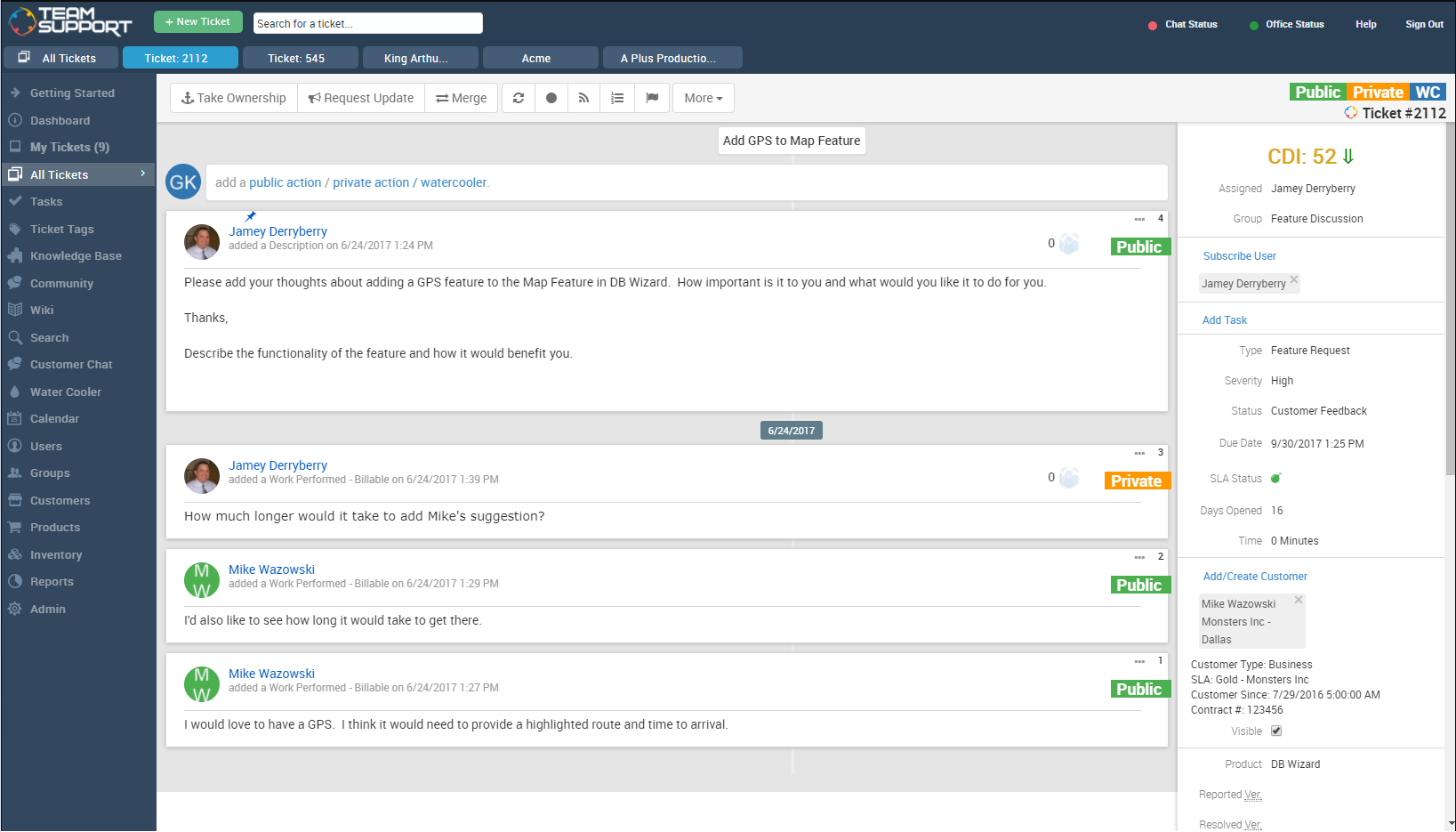
It is a software system that offers easy management and tracking of tickets in a centralized manner with the help of integrations. The ability to generate custom reports and analytics provides better visibility into support metrics. Using its Customer Hub feature, clients can effortlessly convert frequently asked questions into searchable articles, enabling self-resolution of issues without manual effort from a team member.
Why are Businesses Looking For TeamSupport Competitors?
Businesses are actively seeking TeamSupport alternatives due to its pricing structure. While the lower tier plan is reasonably priced, the features are limited, making it less attractive for those who require more robust functionalities. For example, all supervisor features are only available at higher-priced plans, making them less accessible to small teams. The customizable reports and full list of integrations are restricted to the enterprise plan, limiting the flexibility and integration options.
One of the major pain points that customers encounter with TeamSupport is its sluggish and unresponsive user interface. Slow page load times prevent teams from delivering quick responses to client requests. The software’s search function is buggy, often bringing up items that do not meet the specified filters. Many customers express frustration over the bulk editing function as it lacks advanced search and filtering capabilities, making it less efficient for managing multiple tickets.
Adaptability and integration are crucial for businesses, and TeamSupport falls short in these areas. Many customer reviews express disappointment due to lack of customization of the user interface and inability to implement complex workflows for specific business needs. The missing integrations with popular tools like Google Apps and Office 365 is a huge drawback for some teams. The absence of one-click shortcuts for commonly performed activities, such as ticket movements or closures, further hampers productivity.
The software’s outdated user interface and aesthetics do not align with modern standards, creating a less visually appealing experience for users. Due to complexity of features, navigating through the crowded UI can be challenging, causing difficulties in finding specific features or information. This usability factor adds to the frustration and slows down users’ workflow within the software.
Another significant drawback of TeamSupport is its limited mobile interface. Mobile staff members often face difficulties as they cannot view customer contact information or attachments directly from a ticket on mobile devices. This limitation inhibits the productivity and responsiveness of the team, especially for those who rely heavily on mobile devices for their work.
7 TeamSupport Alternatives To Try
Let’s take a look at some TeamSupport alternatives to help you decide which is the best fit for your team. Here are our 7 top picks for TeamSupport alternatives.
1. Enchant
Enchant has been designed from the ground up with ease of use in mind. The product is similar to TeamSupport in many ways and offers a range of features to help you take care of your customers. Enchant is a great TeamSupport Alternative if you want something more robust, yet flexible and affordable.
Enchant boasts an intuitive interface that will seem familiar if you’ve used common business tools like Gmail. That means a shallow learning curve, so your team can get started right away. Enchant is suited to teams from 3 - 300, so there’s plenty of room to grow.
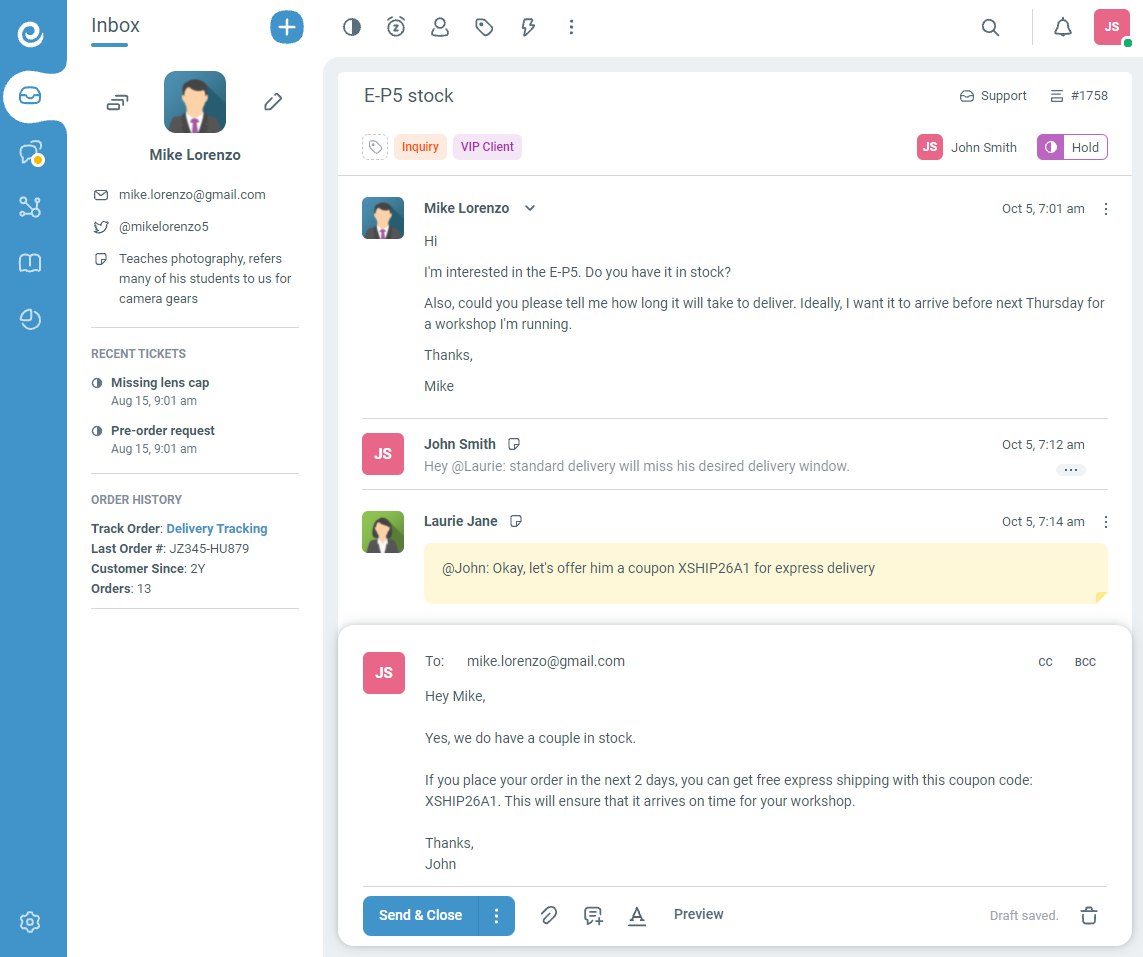
Enchant has been around for over a decade now. Of course we may be a bit biased, but we stand by the quality of our product and our commitment to our customers’ success. The flexible features include a robust set of workflow customizations, to fit teams from a variety of different industries.
With built-in automation and collaboration tools your team can keep their focus on delivering excellent customer service. Many of our customers migrated from TeamSupport and have successfully grown their businesses with Enchant, and you can too!
What Enchant offers:
- Shared inboxes with customizable folders, automations, and collaboration tools.
- Built-in live chat and knowledge base for quick answers. Great for customers who want to resolve their issues without speaking to an agent.
- Customer Satisfaction Ratings (CSAT) so it’s easy to find out how happy your customers are.
- Omnichannel support - receive and respond to customers via voice calls, SMS, WhatsApp, Facebook Messenger and Instagram channels.
- AI Response Writer that generates replies based on your knowledge base and past conversations.
- In-depth analysis and reports that give you insights on trends, team performance, and customer satisfaction.
- Easy integration with popular apps such as Shopify, Slack and many more.
- Simple, affordable pricing: $15 per user, per month. No annual contracts or nasty surprises.
Pros:
- No ticket numbers or log-ins means Enchant is invisible to customers. They only see the stellar customer service they receive!
- Easy and intuitive interface.
- Get set up quickly, with no need for additional training.
- Multiple inboxes with their own permissions and settings. Handle requests individually, or in a single unified queue.
- Manage all your brands and departments separately, but through one single account.
- Supports over 20 languages.
Cons:
- No customer forums or customer dashboard.
- Pro-active messaging is not supported.
2. Zendesk
If you're looking for TeamSupport alternatives, Zendesk is unbeatable when it comes to features. It is robust and reliable. Any major enterprise level business on the hunt for a help desk will find Zendesk meets most if not all of their needs.
Zendesk's features include a shared inbox, knowledge base, live chat, and customer satisfaction tools. They provide both social and phone support even on their starting plan. They also offer detailed analytics and reports you can use to improve your customer service.
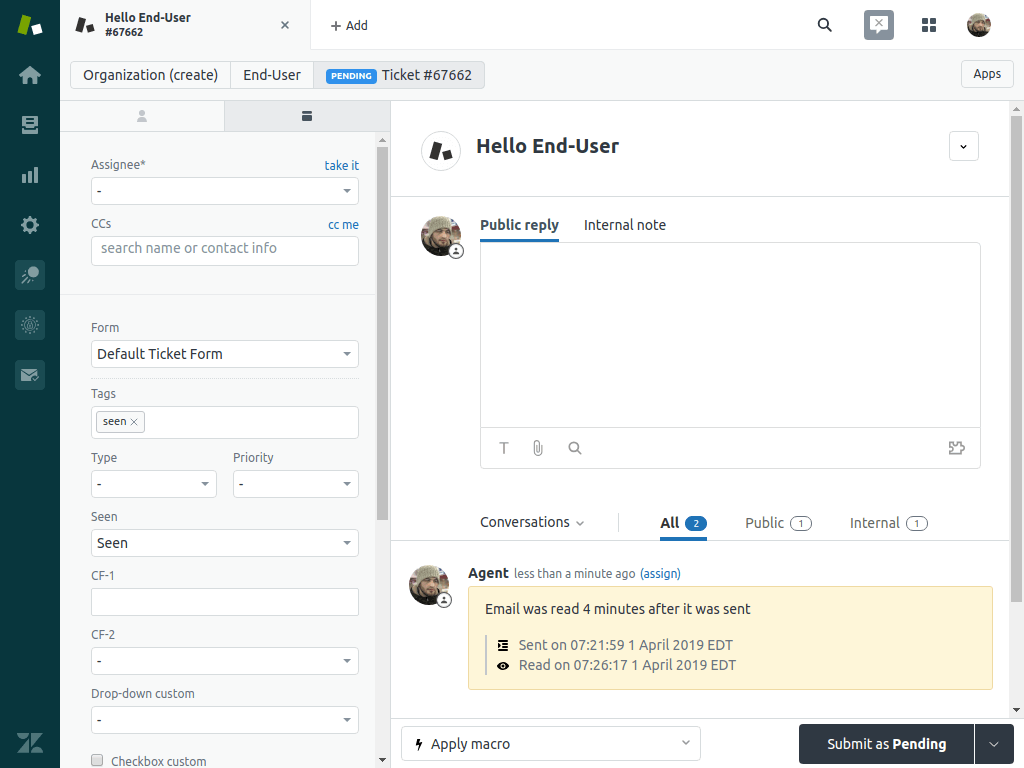
The higher priced Zendesk Suite plan provides sales and marketing features alongside the support management ones. But some users don't need all those features. The sheer amount of functionality can make Zendesk feel bulky and complex. And it isn't exactly affordable for small-mid size businesses as you could end up paying for features you don't need. Many customers also complain that the software evolves very slowly due to its behemoth size.
The interface is also old fashioned and lacks that modern, intuitive feel that some users are looking for.
What Zendesk offers:
- Omnichannel support, including social media.
- A self-service knowledge base so customers can find their own answers without contacting an agent.
- Support for phone calls, and a live chat widget.
- CRM, customer portals, and community forums.
- Reports and integrations.
Pros:
- You can get phone and social channel support even on the lowest plan.
- Robust analytics and reporting capabilities help you make data-backed decisions.
- An advanced CRM with flexible customizations.
- A wide range of integrations with other apps and services.
- If you have the budget to invest more, Zendesk suite gives you added sales and lead tracking features.
Cons:
- The product is bloated and complicated enough that agents need training on how to use it.
- Basic features such as customer satisfaction ratings are only available at higher price points.
- It's not affordable for small - medium sized businesses or bootstrapping startups.
- There's a lack of features available on the mobile app.
- Some customers complain about delays of more than 10 minutes receiving inbound emails.
- Some customers also point out that the user interface can be glitchy.
- Chat and email tickets have their own queues, so it doesn't really feel like you're using one single tool.
3. Freshdesk
If you’re looking for TeamSupport alternatives, Freshdesk is another strong player when it comes to features. Its simpler and more straightforward interface is a plus. You can auto-assign requests based on agent skills, load-balancing, or a round robin sequence. You’ll also find tools for better collaboration with field service teams.
Despite its simpler look, Freshdesk packs in a wide variety of large enterprise features. It’s one of the most popular TeamSupport competitors with those who still need large enterprise functionality.
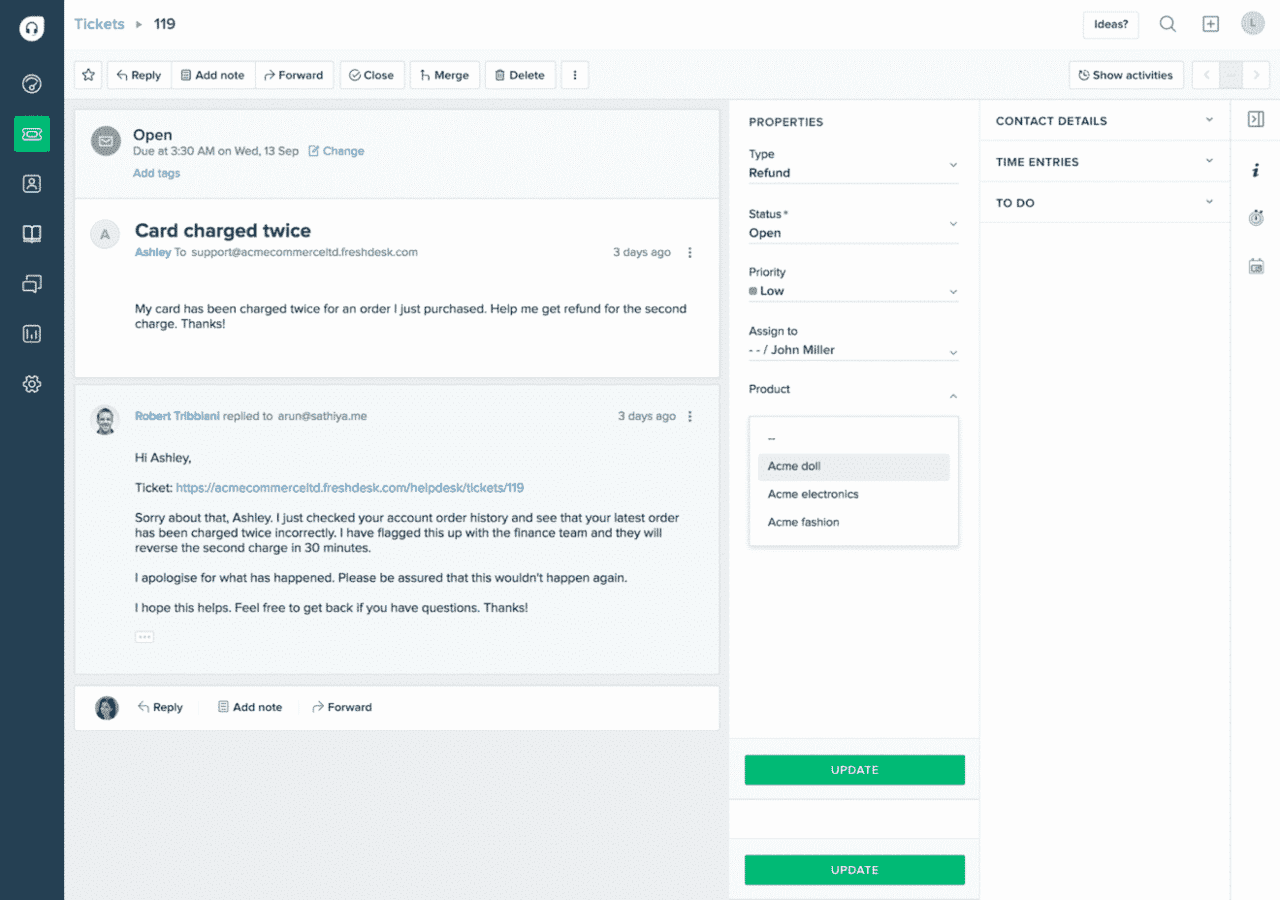
Freshdesk is part of a bigger suite of products called Freshworks. If you’re looking for a tool that offers marketing and sales features, it’s a good idea to check out the rest of the Freshworks suite. Using Freshworks alongside Freshdesk lets you connect various tools that handle specific tasks. However, it doesn’t quite feel like an all-in-one integration solution.
What Freshdesk offers:
- Ticket management for email support, including prioritization and auto-responders.
- Live chat widget for the help center.
- Omnichannel support for social media, so customers can contact you through their preferred method.
- Self-serve knowledge base.
- A customer forum and moderation tools so customers can connect with each other (and your support team.)
Pros:
- Automatic ticket assignment through a variety of criteria such as skill based or round robin.
- A more advanced live chat widget than some other solutions.
- AI assistance via bot so customers can get help right away even if all team members are busy.
- Omnichannel support includes social channels such as WhatsApp Business and Twitter.
Cons:
- Confusing pricing levels
- Some features are only available at higher price points.
- It’s not affordable for small - medium business or bootstrapping startups. Many basic features like team performance reports, social channels, and CSAT surveys cost $70 per seat or more.
- Enterprise level options mean more complexity and a steeper learning curve.
4. Reamaze
Reamaze was designed for businesses with online stores. If you’re an online retail business looking for a customer support solution, Reamaze could be the one for you. It integrates well with popular ecommerce solutions such as Shopify, WooCommerce and BigCommerce to bring in relevant information such as order details.
Reamaze also offers multi-channel support, including social media and live chat.
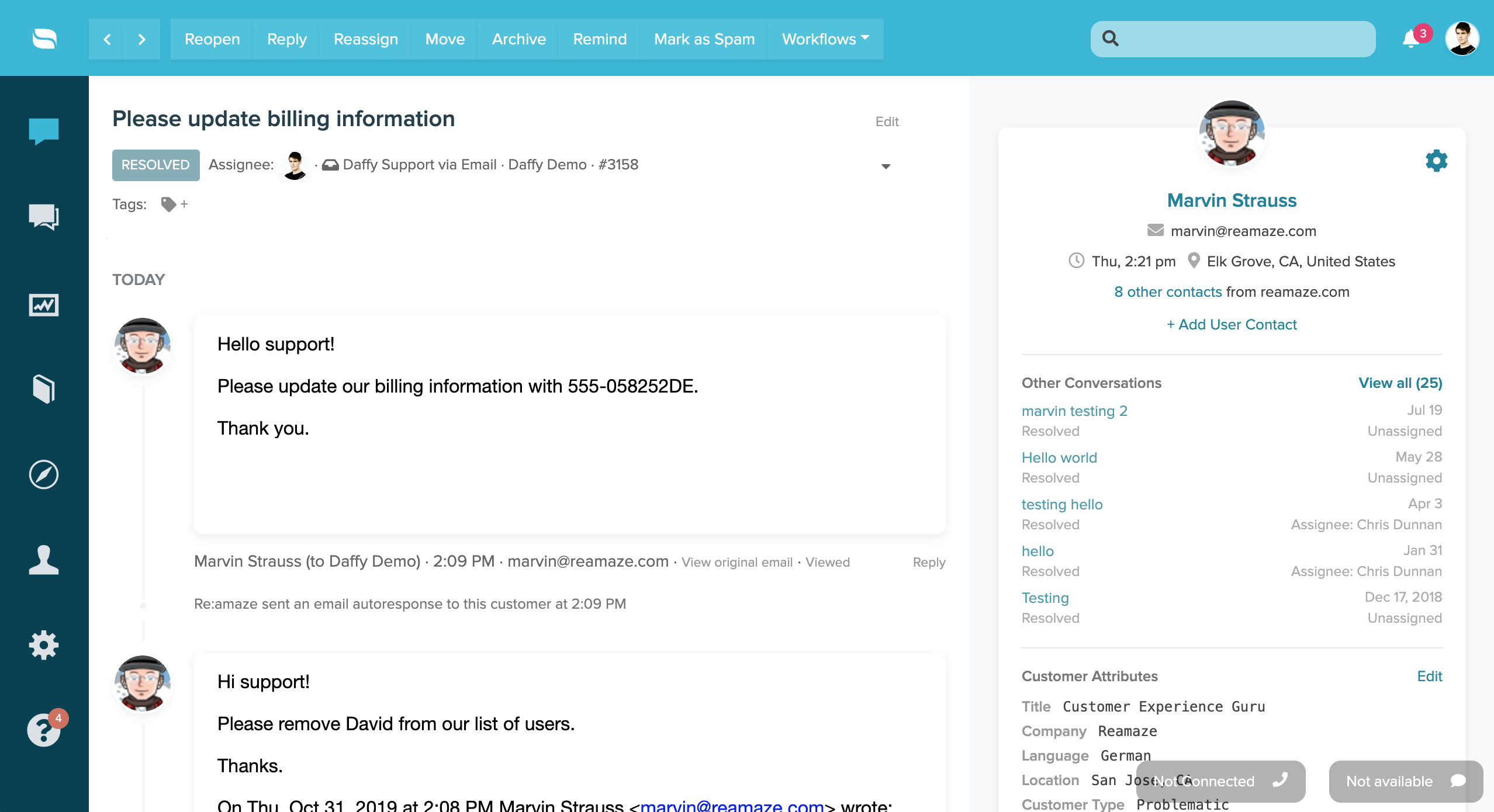
Reamaze is one of the best TeamSupport competitors for ecommerce businesses. Its deep ecommerce integration features, such as being able to give refunds for a Shopify store, make it a powerful tool. But if you need more robust handling of email, such as adding BCC recipients or classic email forward support, you might want to look at some of our other options in this list.
Some users feel that the reporting on certain data points could be better, too.
What Reamaze offers:
- Email based ticketing support.
- Omnichannel integration with social media.
- Robust integration with popular ecommerce tools.
- Live chat tool with chatbots.
- Customer community portal.
- A self-help FAQ center.
Pros:
- Deeper ecommerce integrations allow you to connect multiple stores to one help desk.
- Automated workflows based on customer intent make it easy for your agents to help customers at every stage of their journey.
- Customizable live chat with chatbots.
- Live view of site visitors on higher priced plans.
Cons:
- Weaker reporting of data points compared to some other solutions on this list.
- Some users report a poor experience when trying to like or share social messages.
- Other users report performance issues with the chat app.
- Attaching media such as images to the FAQ is not supported.
5. Gorgias
Gorgias is a great customer service tool for businesses that run online retail stores. It offers deep integration with popular ecommerce platforms like Shopify and BigCommerce, making it easy for teams to quickly take care of tasks like refunds and orders.
Another benefit of Gorgias is the ability to provide customer service across a variety of messaging channels including social, voice and SMS. It comes with an automation add-on that includes sentiment analysis, auto-responders and self-service options to make your support team more efficient. Built-in satisfaction surveys allow you to keep customers in the feedback loop.
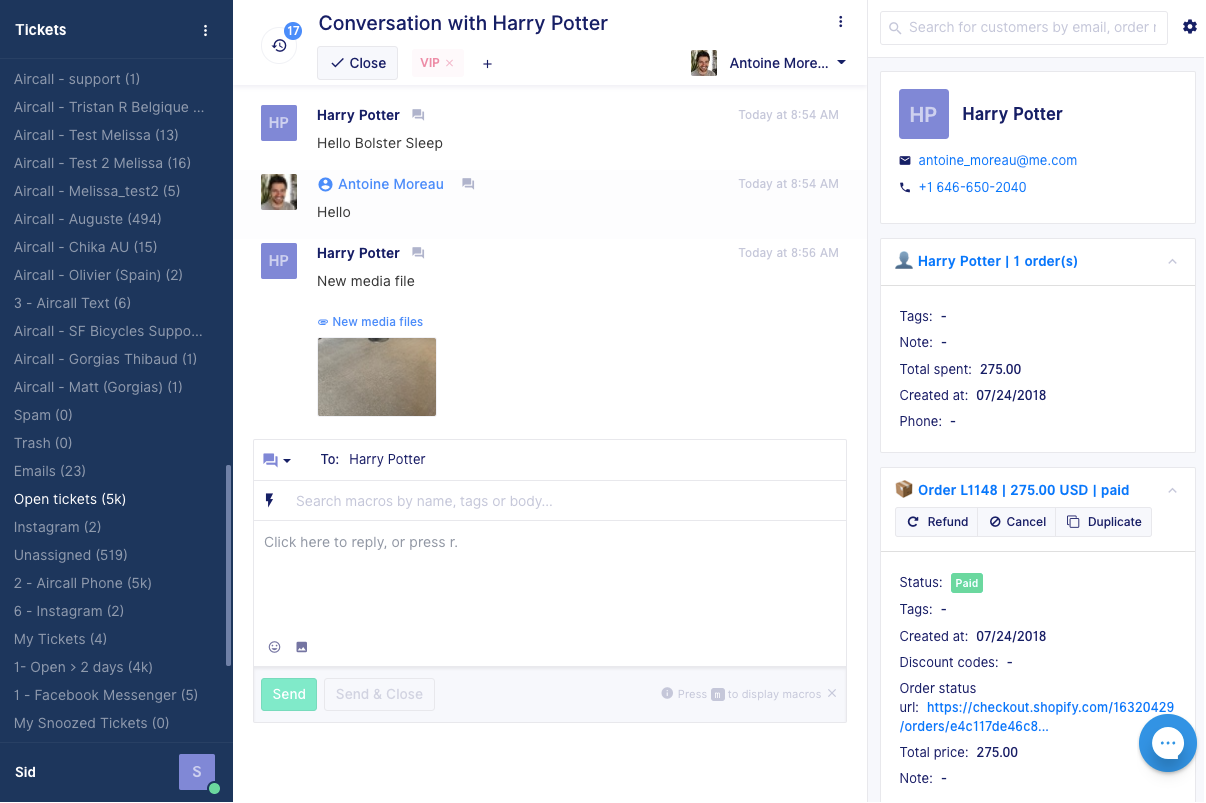
If the need for ecommerce integration is your primary pain point, Gorgias might be the right TeamSupport alternative for you. But if you've got a team that deals with a higher volume of customer inquiries, their ticket-based pricing might not be the right fit for your business.
Their plans come with multiple pricing models with paid add-ons for features like automation, but all of them have ticket limits. And certain features like Twitter integration or customer onboarding are only available on their higher plans.
Plus, their standard help desk features don't seem to be as well developed as their ecommerce platform integrations. So, you'll have to weigh your options carefully.
What Gorgias offers:
- Ticket management along with satisfaction surveys.
- Live chat for your website.
- Provide multi-channel support: social media, SMS, and voice so customers can use their preferred channel.
- Self-service help center.
- Automation including rules, sentiment analysis and auto-responders.
Pros:
- Deep integration with ecommerce platforms like Shopify & BigCommerce.
- Unlimited agents, except for the starter plan.
- Omnichannel communication.
- Built-in analytics for support performance and live chat.
Cons:
- Reporting feature is not as robust, customers complain about not being able to drill down to the details.
- Email based features are not well developed, with file size limits and no bcc support.
- Some features like Twitter integration are only available at higher price points.
- All plans have upper limits for the number of conversations - not suitable for teams with high volumes.
6. Front
Front makes things easy by keeping their app familiar and intuitive. That means the learning curve isn’t too steep, so you can get set up quickly. Front users can manage their personal and shared inboxes in the same place.
Front also supports social channels and SMS so customers can use their favorite way to get in touch. Customers are looking for fast responses to queries across all channels, so social media integration is vital. Front offers a robust set of collaboration features to enable teams to work together efficiently.
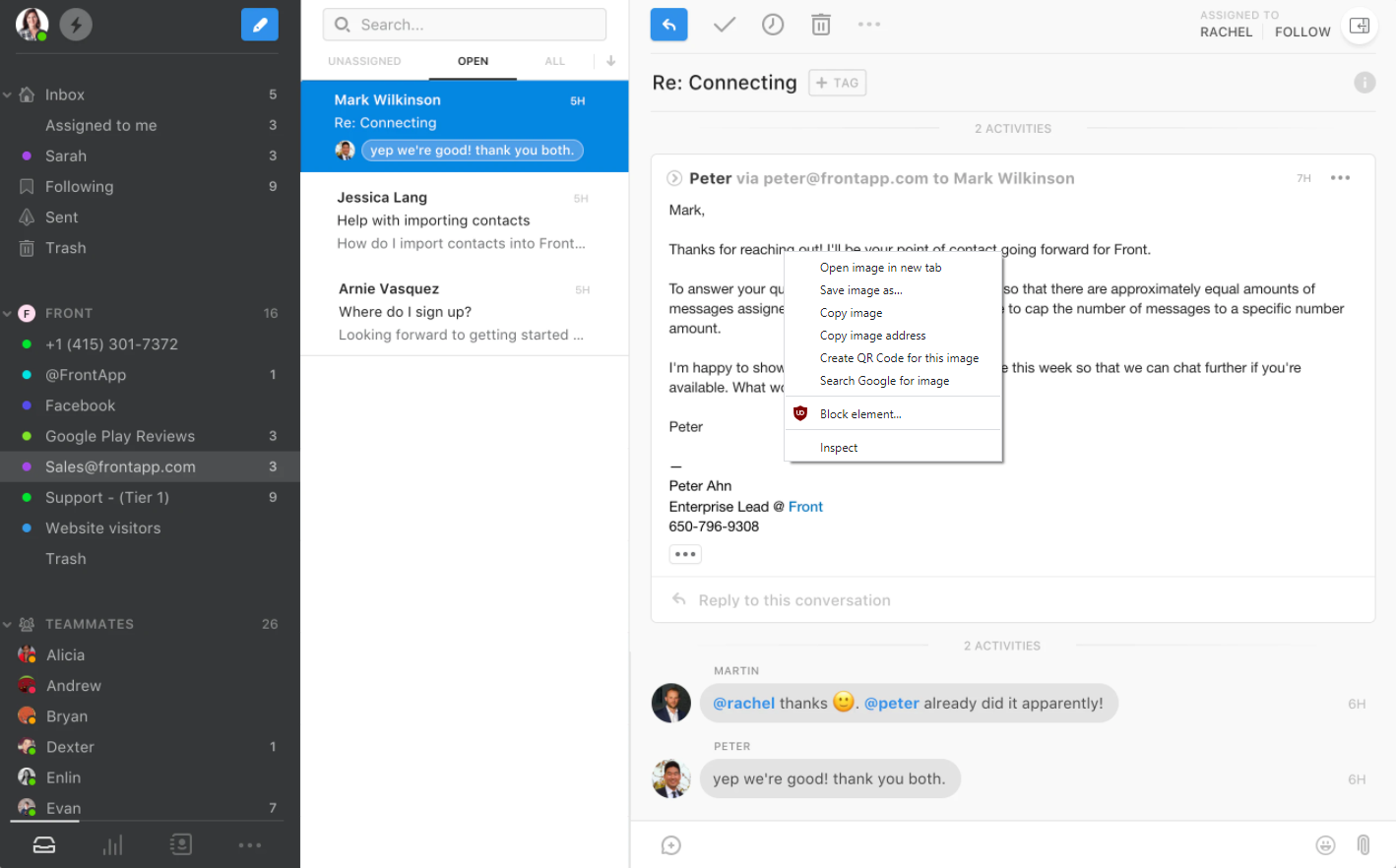
If your team relies heavily on cross-collaboration for a majority of requests, Front could be a great TeamSupport alternative for you. But if your team has a certain way it likes to work, or you need something beyond basic workflow customization, it might not be flexible enough.
Front is ideal for smaller teams, but can get expensive for teams of 10 or more. Add in the fact that all pricing plans require a commitment of a year in advance, and you might find it challenging to grow your team with Front.
What Front offers:
- Unified inbox with email and SMS threads in one place.
- Social media integration.
- Ability to manage both personal and shared emails within the same app.
- Custom workflow automation (available on higher priced plans only.)
- Integrates with popular sales and CRM tools like Salesforce and Hubspot.
Pros:
- Makes collaboration a breeze with team oriented tools such as collaborative drafts and tasks.
- Omnichannel communication.
- Strong integrations with external apps and custom plugins.
- User-friendly interface, and it’s quick and easy to set up.
Cons:
- Ticketing system isn’t robust enough for teams with higher support volumes.
- Not flexible enough for teams that need customized workflows. The more affordable price points only offer limited workflow customizations.
- Requires an annual contract, making it hard to switch tools later if you want to.
- Higher plans can be pricey for small-medium companies.
- Some bigger teams (50+ people) notice performance issues.
7. Zoho Desk
Zoho Desk is a customer service tool that allows you to easily communicate with your customers through popular channels like email, live chat, social media, and phone. It's packed with a ton of features like automation and rules that provide a high level of customization so you can tailor the product to your specific needs.
It comes with an advanced AI bot called Zia, that can perform tasks like auto-tagging, sentiment analysis and assisted replies. Zoho Desk also integrates with text messaging apps, like WhatsApp and Telegram, giving you more options to communicate with customers. If you're looking for a TeamSupport competitor that supports multiple languages for both agent and customer interfaces, Zoho Desk could be the right fit for you.
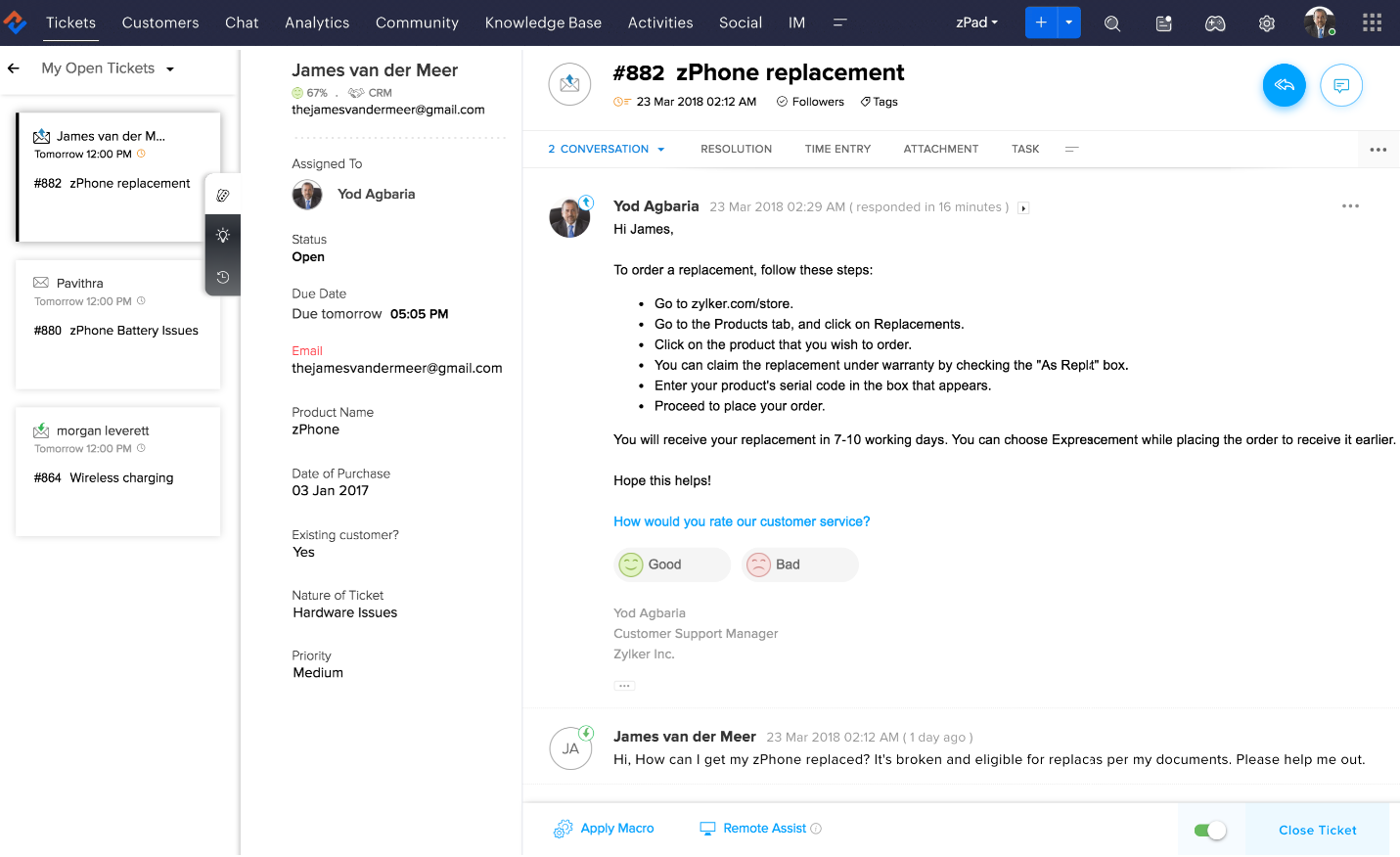
Zoho Desk provides some great features for larger teams, including a light agent seat who can view the conversations and participate in private comments. Plus, integrations with other Zoho apps that they may already be using is an added bonus for teams that are looking for a TeamSupport alternative.
Although Zoho Desk offers a range of price tiers including a free plan for small teams, their cheaper plans can be quite limiting when it comes to functionality. The higher plans, that come with all the bells and whistles, can be a bit pricey at $44 per seat. Due to the sheer number of features it offers, the tool can be a bit complicated to set up and the user interface can feel overwhelming to some agents.
What Zoho Desk offers:
- Ticket Management system with customer portals.
- Omnichannel support including social, text-messaging, and telephony.
- Knowledge base for self-service.
- Live chat widget with co-browsing.
- Reporting on agent performance and time-tracking.
Pros:
- Support for text-messaging apps like Telegram.
- Advanced AI features like sentiment analysis and auto-tagging.
- Multi-language support for agent and customer interface.
- Built-in support for social channels and voice.
- Ready-to-go integrations with other Zoho apps.
Cons:
- Limited low priced tiers. Higher tier is pricey at $63, and yet have limits for brands and channels.
- Shorter 15-day trial period with slow customer support.
- Complicated to set up due to a large feature set.
- Clunky and bloated user interface - harder to train agents.
- Performance issues and slow load times.
Conclusion
The best TeamSupport alternative for your team is the one that offers just enough functionality that you need, with the right level of flexibility for your business to grow. Remember, the whole point is to have something that makes it easier to help your customers without feeling bulky or overly pricey.
If you need further help in choosing the best TeamSupport alternative, please see our detailed guide on how to choose a help desk.
At Enchant, we believe in delivering value to our customers without binding them into contracts. We also offer a free-of-cost and fully managed import of all conversations from TeamSupport. If Enchant's offering meets your needs, we recommend you try it out with your team today!